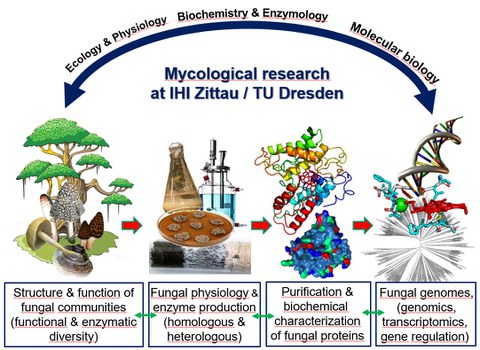Strong in research on fungal biodiversity: The Chair of Environmental Biotechnology introduces itself
The Chair of Environmental Biotechnology is headed by Martin Hofrichter since December 2001. Two associate professorships (apl. Prof.) are held by Christiane Liers (Bioinorganic Chemistry, Protistology) and Stefan Fränzle (Environmental Chemistry, will introduce himself separately in a newsletter). The other permanent staff includes Dr. René Ullrich (General Mycology, Biochemistry and Enzymology), Dr. Harald Kellner (Molecular Ecology, Genomics) and Dr. Alexander Karich (Special Mycology, Biotechnology), the laboratory engineers Britta Bittner and Martin Kluge, and technical assistant Ulrike Schneider (maintains IHI Zittau's culture collection of over 700 fungal species/strains). In teaching and research, mycology (fungal sciences) is of central importance, not least because of the enormous biodiversity and biochemical plasticity of fungi. Biodiversity refers both to the diversity of fungal organisms as such (the so-called Funga in addition to Flora and Fauna) and to the functional diversity of their biocatalytic services. These services are equally important for ecosystems (carbon cycle, degradation and transformation of lignocelluloses/deadwood and humus) and biotechnology (e.g. as a material basis for chemistry or pharmaceuticals). Mycology at IHI Zittau tries to cover all facets of modern and classical mycology, ranging from the Funga of Upper Lusatia, to the decomposition of dead wood in the forest, to fungal cultures and isolated enzymes in the laboratory, and eventually to fungal genomics and special fungal genes (Fig. 1).
Fig. 1
In the past 20 years, about 200 scientific articles (Scopus) have been published in this context at IHI Zittau, 23 PhD theses have been successfully completed and more than 30 larger projects (e.g. EU, DFG, BMBF, DBU) with a total budget of around 12.5 million Euros; four representative research projects are presented below.
In teaching, the professorship is not only active in its own Master's program "Biotechnology and Applied Ecology", which is run jointly with the University of Applied Sciences Zittau/Görlitz in German language, but it is also involved in the English-language IHI courses "Ecosystem Services (ESS)" and "Organismic and Molecular Biodiversity (OMB)", the latter in cooperation with the Senckenberg Museum Görlitz. In addition, the mycological expertise of the professorship is being fed into the English-language Master's program "Molecular Biosciences and Productive Biosystems (MBioPro)" of the Faculty of Biology at TU Dresden since the summer semester 2022.

